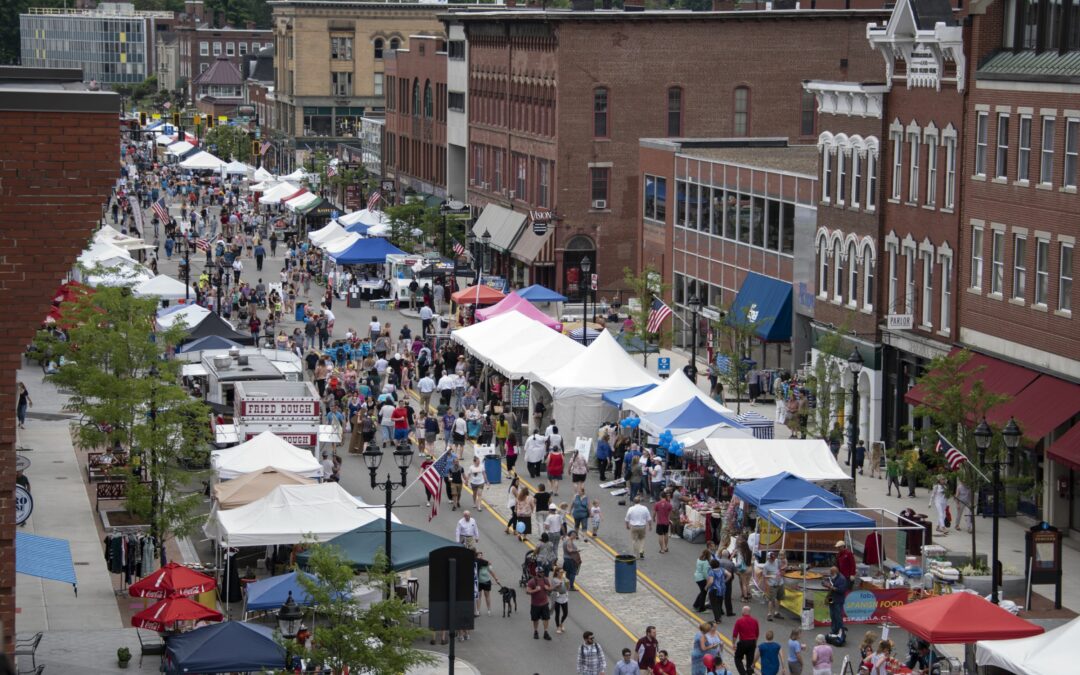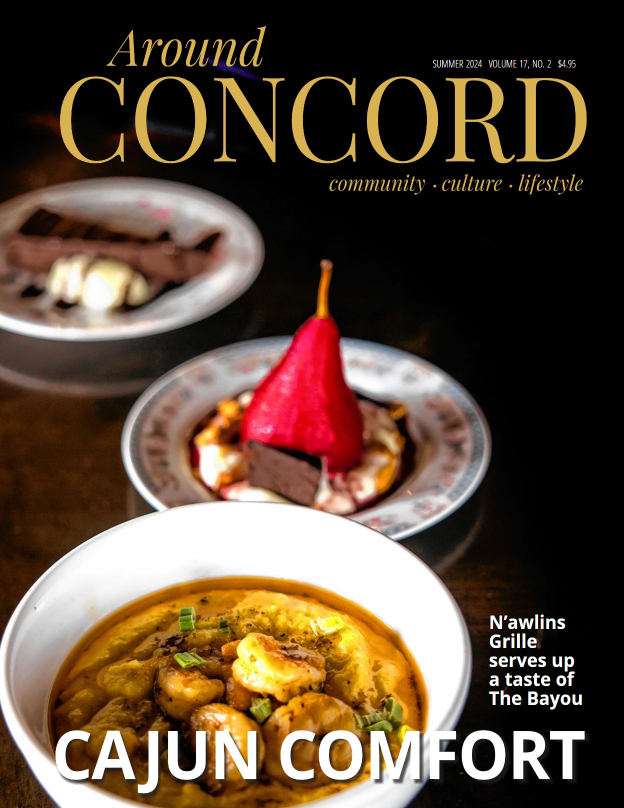It’s been a whirlwind past few months for Jessica Martin, who took over as the new executive director of InTown Concord in December, months into a pandemic and at a time when climbing infection rates and the uncertainty of the vaccine rollout made even the optimists among us fret for the months ahead. Martin’s mission is to promote downtown Concord, mostly through events, a job description made all the more difficult in a remote world. Martin, though, forged ahead and she’s helped plan the city’s marquee event, Market Days, for the end of the summer. Martin sat down with Around Concord publisher Steve Leone to discuss her role, what’s on tap this summer and what’s to come.
Around Concord: A lot of people may not know what InTown Concord is or does. Can you give us an overview?
Jessica Martin: Our mission is to promote, elevate and celebrate the city of Concord and we have a focus on the downtown community so we try to support small businesses and shopping local. Our major job, if you will, is that we put together large community events. So we are kind of a convener, bringing people downtown. We do that through Market Days, which is our most well-known event. We also have Midnight Merriment and Halloween Howl. We have a winter festival that we do in January, and a couple other events throughout the year, so just basically trying to put Concord on the map with the large events, getting people down here and getting them to experience all that Concord is – the great downtown that we have, the lovely retail shops and restaurants.
AC: So why don’t you tell me about yourself, how you arrived to this spot.
JM: So I’m originally from Maine, and I went to Southern New Hampshire University. So that’s kind of how I got into New Hampshire, and I ended up at the Greater Manchester National Board of Realtors as the marketing person and then I became the Executive Director. … So, a little bit of a meandering path to get here, but when I saw this position available I thought, this is just the perfect marriage of the executive director position, which I loved, and the events that I really loved. So I get to focus on events but I also get that nonprofit management piece.
AC: So you came this past December. What’s that been like as someone who’s drawn to events coming in a time when events don’t happen?
JM: Yeah, it was a little bit like, “You can have this job, but it’s a pandemic, so good luck with that.” I was looking at it as though we weren’t going to have any events. At least for 2021, I was thinking that way. But I think that events are such an important piece to getting back to normal and having some sense of normalcy and community. So I knew that they’d come back. I just knew it was a matter of time. I knew it was important for the person stepping into this role to be able to think outside the box. I had done some virtual events and I was comfortable with that so I thought, “Oh, if that’s what I have to do, I think I’m the right person for that because I have done it.” So I was prepared to do that and, luckily, for 2021 all of our events will go forward because we did our winter festival. We actually added a Follow the Bunny event, which was kind of fun, for Easter, and Market Days is going forward. So every event is scheduled to move ahead.
AC: Of course, Market Days is your big event. What was that decision like, and how did you make that decision? What considerations did you have?
JM: I started in December so coming on, Market Days was on the calendar for June, and just looking at it I’m thinking, you know, June seems too soon for vaccines and COVID and everything. Probably in January I brought it to the board and said, “What about August?” They had thought about moving it to August the previous year and ended up canceling it, and they were all on board with that. It gave us just that much more time to see where everything was. Also, selfishly, it gave me a little time to get my bearings before I had to plan this event. The board was very supportive and I think the timing is going to be perfect.
AC: What’s it going to look like this year?
JM: We’re moving forward, kind of going back to basics in the sense that it’s going to be what people have always experienced with Market Days. It’s going to be music and food and shopping, but there’s not going to be a lot of extra stuff. We’re going to have all of our vendors. The city hasn’t said that we have any type of limit as far as what we can have for vendors. So it’ll be our normal number of vendors. We’ll have three stages – Bicentennial Square, Eagle Square and the main stage on Main Street. We’ll have a kid zone. So it’s going to look very much like it has in the past. We’ve done a tightrope walker before and a hot air balloon. We’ve done a lot of extras and this year we’re really just going back to basics on a lot of things. We are going to encourage people to wear masks. We’re requiring our vendors to wear masks, we’re going to have stations for hand sanitizing and, we’ll be promoting social distancing.
AC: Things that are just part of life now.
JM: Yeah. For right now, but you know, in August, things could change and it could feel totally different so we’ll see but that’s the way we’re approaching it. I think the timing is good too because enough people will have been vaccinated by then, and enough people will have been doing things throughout the summer. So being outside at a festival won’t seem as strange.
AC: Who gives you guidance on health-related issues? Do you do talk to the hospital or the city?
JM: The city is a huge support for us in that sense. They have their health officer, Gwen Williams, who we work really closely with. We also talk to other event coordinators throughout the state and see what they’re doing. We’re part of a networking group to see where other people are at on things like that. On our board, we have somebody from Concord Hospital too. Something that was really exciting for us is that the Chamber of Commerce had the governor in for the State of the State and someone asked him on the call, “What about events like Market Days? How are you feeling?” and he was like, “Full steam ahead. Go big. Plan as you always would.” So it felt good to get the governor’s stamp of approval on specifically Market Days.
AC: How would you characterize the mood of downtown Concord at this point?
JM: I feel like everyone’s excited. It’s just that time of year where the weather is starting to get nice and you know people are going out more and the merchants that I’ve talked to, the restaurants that I talked to, they’re all really excited. We have the expanded outdoor seating going on right now downtown. That’s a huge help for the restaurants who’ve been experiencing such a revenue hit through this last year. So that really helps them to have that option for outdoor seating.
AC: I know that’s been extended for this year. Any idea if that’s going to last?
JM: Anecdotally I think everybody wants to see that be something that stays after the pandemic – the people that we talk to supporting the restaurants, and the restaurants too. As a downtown organization promoting the downtown, it’s so vibrant. When people are outside eating and chatting and you see their dogs and it’s just such a nice feeling. So it becomes easy to promote that to people outside of Concord.
AC: What do you see as the biggest challenge facing Concord after the pandemic?
JM: I think our job, something that InTown is doing is trying to promote Concord to businesses looking to come in. That’s something that continues to be a priority for the city – just promoting the downtown to incoming businesses and filling some of those vacant storefronts. It continues to be a challenge moving forward, especially because the pandemic has impacted some small businesses.
AC: So how do you do that? How do you promote Concord to those businesses?
JM: I think that in some ways, the pandemic helped us with that because a lot of people now realize that they don’t have to live in metropolitan cities like Boston. Maybe they’re seeing Concord as a great option versus living in Boston or living in one of those big cities where commuting is such a headache. From a downtown perspective, I think we have so much to offer. We have great stores, great restaurants. The landscape of our downtown is, as far as I’m concerned, the best in New Hampshire because of the changes made a few years ago.
AC: Restaurants are certainly a big part of downtown, and they’ve faced some really significant challenges. Some have found different ways to do business and probably in ways that will serve them for a long time going forward. And then there are places like arts venues, which aren’t doing well right now. Do you have any specific goals or plans to help lift the arts community, which is seen as a big, big piece of Concord’s business future?
JM: One thing that we’re planning to do in the fall – actually, we have a date now, it’s October 2 – is we’re doing an upstairs downtown tour, and we’re planning to do that with the different theaters that we have downtown. So it will showcase some of those places that have been shuttered during the pandemic. Our plans are to go to the Capitol Center for the Arts and then we’re going to start at the Red River Theatres and then from there, the different groups will break off and go get tours of different areas and each area will have a little show with it. These are huge economic drivers for the downtown, and we need to support them in whatever way we can right now. It’s tough. I can’t wait till we get there. I know they’re coming back though. And then also the Capital Arts Festival will be at the end of September. That’s not an InTown Concord event per se, but we are on the committee that’s working on it. So that will be promoting art and getting the word out there. I think really we should be a destination for people who want to experience the arts because there is so much here. And some of it is just letting people know. u


 View Print Edition
View Print Edition